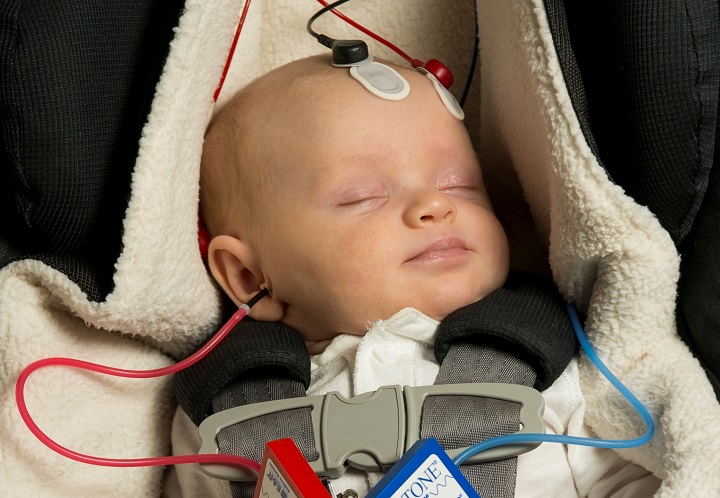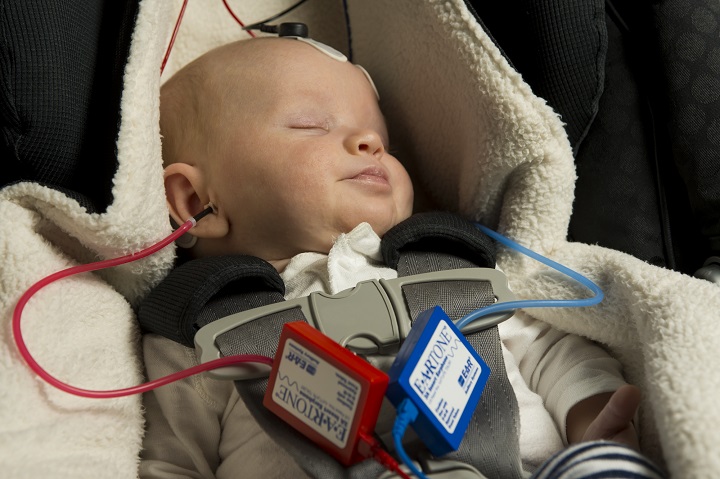Infant testing

Your baby might require further hearing testing if he or she did not pass hearing screening or has certain risk factors for hearing loss.
Your baby will be referred to your
local public health audiology clinic if further hearing testing is recommended. There is no cost for this appointment and you do not need a referral from your doctor.
The hearing testing done for your baby is called Auditory Brainstem Response (ABR) assessment and it is done while your baby is sleeping. It is important that ABR testing is completed before your baby is 3 months of age.
It is important to attend the recommended appointments to find out more about your baby's hearing. Over half of all infants identified with hearing loss are healthy and have no family history of hearing loss. Much can be done to help your baby’s language learning when hearing loss is identified early in life.
ABR assessment is an in-depth hearing test for your baby that is completed by a specially trained and certified pediatric audiologist.
All babies who do not pass hearing screening are referred for ABR assessment. ABR assessment takes longer than hearing screening because it identifies babies who have hearing loss and provides detailed information about your baby’s hearing levels. The ABR assessment is safe and does not hurt your baby.
ABR assessment can only happen while your baby is sleeping. It is important that you bring your baby to the appointment awake but ready to fall asleep in the clinic.
It is important to keep your ABR assessment appointment to find out exactly how your baby hears. Sometimes it takes more than one appointment to accurately assess a baby’s hearing.
The ABR assessment is done while your baby sleeps. You will sit with your baby in a comfortable chair during the testing. The ABR assessment is scheduled for 2 to 3 hours, which includes time for you to feed your baby and help your baby fall asleep. Please be prepared to feed your baby in the clinic during the appointment.
Your baby is set-up for ABR assessment with two sensors on the forehead and one behind each ear. Sounds are played through earphones that fit inside your baby’s ears. The sensors detect how your baby’s ears and brainstem respond to sounds.
In most cases the results of the ABR assessment will be explained to you immediately after the test.

ABR assessment can only happen while your baby is sleeping. It is important that you bring your baby to the appointment awake but ready to fall asleep in the clinic. Try to keep your baby awake for at least 1 hour before the ABR assessment.
- Try to delay feeding your baby for at least 1½ hours before the ABR assessment. You may feed your baby in the clinic during the appointment.
- If you are driving to the appointment, have an extra adult in the car to play with your baby and keep him or her awake.
- Bring any special blankets or items that may help your baby sleep.
There are no supervised play areas in the hearing clinic. If you need to bring other children with you, please bring another adult to look after them.
If your baby has a normal ABR assessment result and does not have any risk factors for hearing loss: No further testing is needed.
If your baby is found to have normal hearing and has one or more risk factors for hearing loss: The audiologist will refer your baby for follow-up hearing testing.
If your baby is identified with hearing loss: Regular hearing testing will be recommended for your baby.
Lots of parents ask why the ABR appointment does not happen right after the hearing screening. Although we understand that it can be difficult to wait, we recommend that babies are at least 4 weeks old for ABR assessment because:
- Some early research has shown more accurate ABR assessment results when babies are at least 4 weeks old.
- If your baby has fluid or debris in the ears from birth, waiting a few weeks gives the ears a chance to clear.
- After 4-6 weeks you are more familiar with your baby’s feeding and sleeping patterns, we find that babies are more easily settled to sleep in the clinic which is important for the ABR assessment.
Yes, there is a chance that your baby has hearing loss. It is very important to follow-up with recommended appointments. Over half of all infants identified with hearing loss are healthy and have no family history of hearing loss.
Many families have told us that this can be a challenging time. You are still getting to know your baby and you have probably been given lots of information, which may seem overwhelming.
You are part of an excellent program that has been designed to support and help guide your family through these early stages. It is important for your baby that you stay involved.
Please see our section on Early Language Support for more information about the process you will be guided through.

